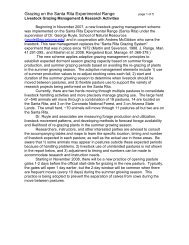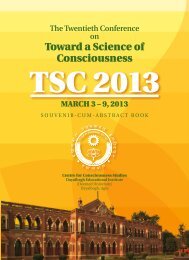CONSCIOUSNESS
Download - Center for Consciousness Studies - University of Arizona
Download - Center for Consciousness Studies - University of Arizona
- No tags were found...
You also want an ePaper? Increase the reach of your titles
YUMPU automatically turns print PDFs into web optimized ePapers that Google loves.
40 1. Philosophy<br />
1. Philosophy<br />
1.1 The concept of consciousness<br />
1 How William James Accidentally Created Behaviorism Bernard J. Baars<br />
(The Neurosciences Institute, Berkeley, CA)<br />
William James’ Principles of Psychology (1890) is regarded as the greatest summary of<br />
empirical knowledge about consciousness of the 19th century. James covered perception and<br />
cognition, language and the fringe, and much more. He defined psychology as ‘the science<br />
of mental life,’ meaning ‘conscious mental life.’ The 19th century was a Golden Age of Consciousness<br />
Science, with discoveries about hypnosis and conversion disorders, the brain and<br />
emotions, Broca’s and Wernicke’s areas, imagery, feelings, multiple personality disorder, the<br />
limits of consciousness and immediate memory, and more. James’s book was greeted almost<br />
immediately as a masterpiece, and three years later, he produced his Briefer Version (1893),<br />
which became the most widely used introduction to psychology in American colleges until<br />
about 1920. It established James as a founder of empirical psychology. James placed consciousness<br />
at the center of psychological science. And yet, paradoxically, he triggered seven<br />
decades of scientific rejection of human consciousness. His paper of 1904 called ‘Does consciousness<br />
exist’? was published in Psychological Review, under the editorship of John B.<br />
Watson. James’ 1904 paper reflected his ambivalence about a science of mind and free will.<br />
James suffered from repeated near-suicidal depression, which often focused on free will. By<br />
1904 James was looking to psychic phenomena and the soul as a solution to his crisis of<br />
meaning and spiritual comfort. The 1904 paper sought to eliminate mind-body paradoxes by<br />
decomposing ‘consciousness as an entity’ into a series of conscious moments; but James never<br />
denied that mental life consisted of such subjective moments. It was John B. Watson who<br />
decided to cut the mind-body knot, proclaiming his radical behavioristic manifesto two years<br />
after James died in 1910. To make psychology into a ‘respectable’ science Watson argued for<br />
a complete purge of consciousness, volition and self. Watson’s radical behaviorism erased<br />
almost the entire psychological vocabulary. He was strongly encouraged by Bertrand Russell<br />
in England, and by a parallel purge in Russian physiology, beginning with Sechenov and I.P.<br />
Pavlov, in Germany by Helmholtz and positivism, and by a radical reductionistic movement<br />
in biology. In a political context Watson, Pavlov (and later Skinner) promised utopian manipulations<br />
of the human condition, simply by analyzing and controlling human beings by reflexes<br />
and operant training. Reflex-reductionism became the orthodox wisdom in the newly made<br />
academic sciences of psychology and physiology, in spite of a total absence of proof. Even<br />
today ‘reflexes’ and ‘conditioning’ are still viewed as ‘atoms’ of behavior. But behaviorism<br />
gave a consistent physicalistic basis to the new and insecure academic fields of psychology,<br />
sociology, political science, and analytic philosophy. The behavioristic purge was pursued for<br />
almost a century. The result was a kind of psychic wound in the Western intellectual tradition,<br />
a Dark Age comparable to the purge of classical learning by the medieval Church. While<br />
literature and Continental philosophy built upon James’ work, the new academic sciences<br />
rejected some 25 centuries of humanistic scholarship, going back to ancient Greece, and in<br />
Asia, to Vedanta, Buddhism and Taoism. PL1<br />
2 Zen’s Civil War over the Definability of Consciousness: Medieval Asian Roots of<br />
Contemporary Conceptions of Consciousness Cody Bahir <br />
(Asian and Comparative Studies, California Institute of Integral Studies, Burlingame, CA)<br />
Is the notion of consciousness a quantifiable entity or is it merely an arbitrary construct we<br />
as humans have formulated in an attempt to grapple with the experience of self awareness?<br />
This question lies at the heart of many philosophical discussions concerning the nature of<br />
what we call “consciousness”. Though the debate between these two positions has reemerged<br />
into the limelight of a number of intellectual and scientific disciplines, the friction generated<br />
from this conflict was the main source of the great schism that occurred between the two<br />
competing schools of Zen in the 8th Century C.E. According to traditional Zen history, the







